Representation of Virtue in Shakespeare's Julius Caesar and Prince
VerifiedAdded on 2023/01/19
|8
|2492
|84
Essay
AI Summary
This essay explores the concept of virtue as represented in William Shakespeare's 'Julius Caesar' and Machiavelli's 'The Prince,' arguing that a political person must possess both Shakespearean and Machiavellian virtues. The analysis contrasts Brutus's noble but ineffective virtue in 'Julius Caesar' with Machiavelli's pragmatic view of virtue in 'The Prince,' where qualities like generosity, compassion, and even cruelty can be considered virtuous if they benefit the state. The essay examines how these interpretations inform the actions of political figures, using examples like Donald Trump's policies and historical instances of leaders prioritizing national interest over personal virtues. Ultimately, the essay concludes that understanding both perspectives is crucial for comprehending the complex moral landscape of political leadership. Desklib provides numerous resources for students, including past papers and solved assignments, to aid in their academic pursuits.
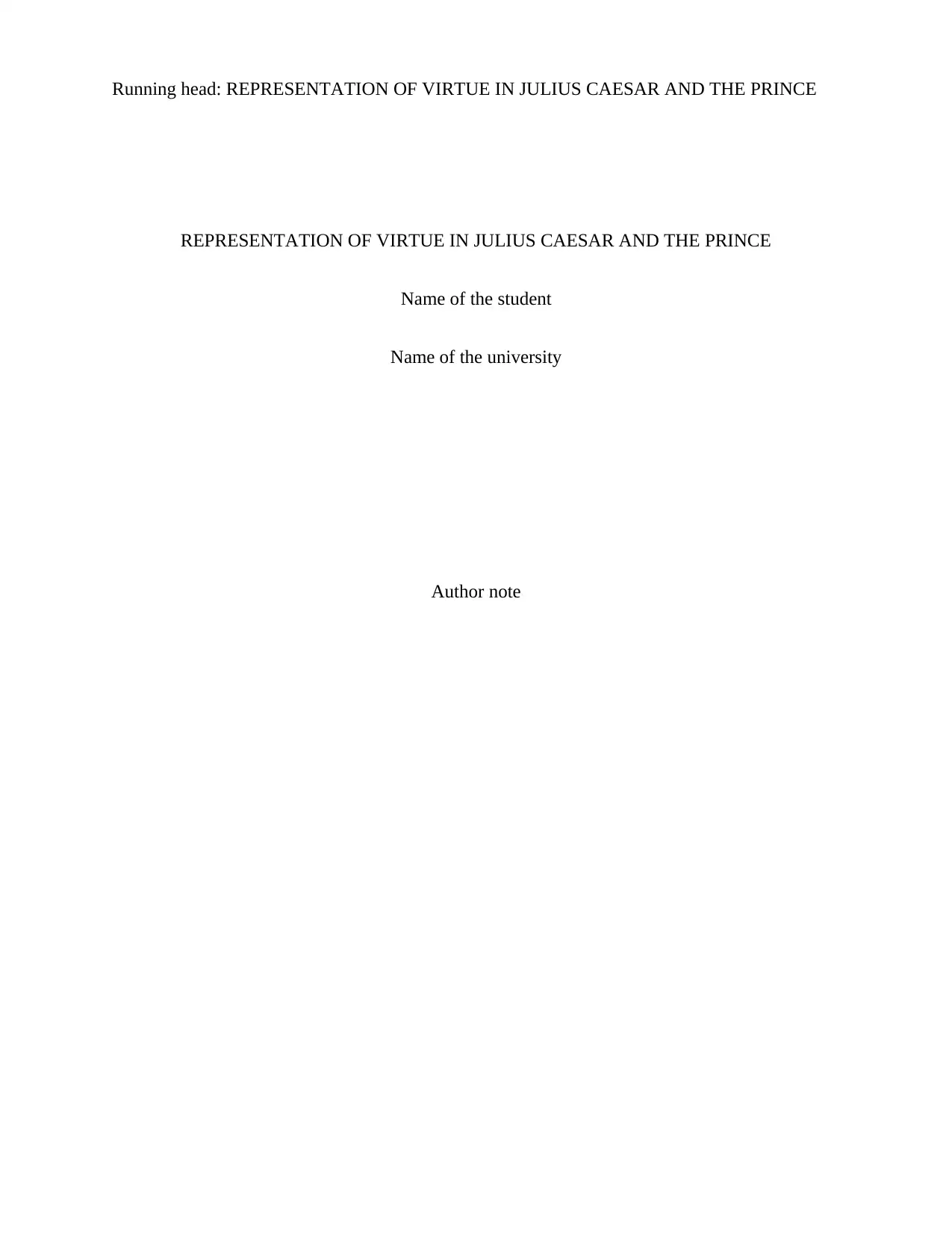
Running head: REPRESENTATION OF VIRTUE IN JULIUS CAESAR AND THE PRINCE
REPRESENTATION OF VIRTUE IN JULIUS CAESAR AND THE PRINCE
Name of the student
Name of the university
Author note
REPRESENTATION OF VIRTUE IN JULIUS CAESAR AND THE PRINCE
Name of the student
Name of the university
Author note
Paraphrase This Document
Need a fresh take? Get an instant paraphrase of this document with our AI Paraphraser
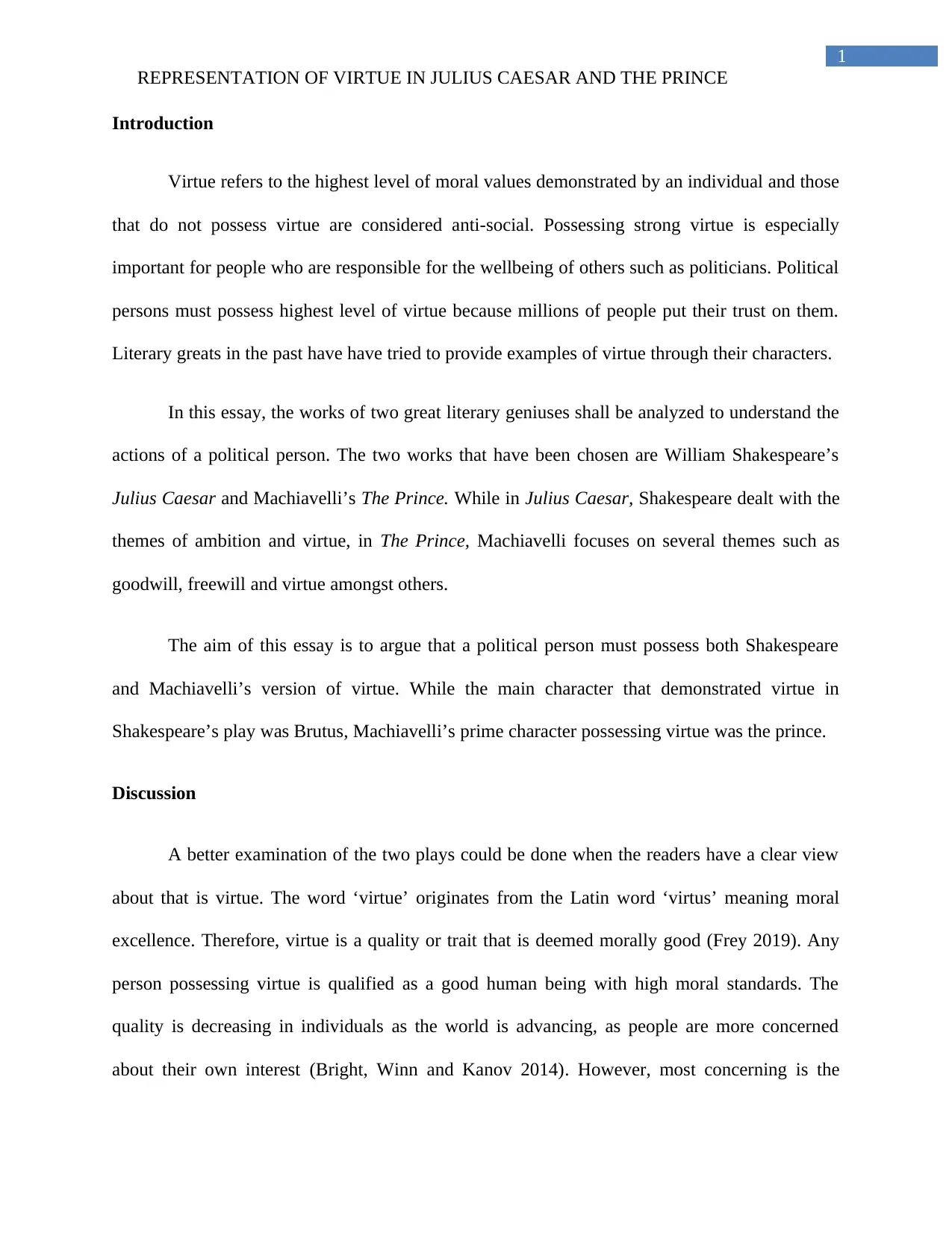
1
REPRESENTATION OF VIRTUE IN JULIUS CAESAR AND THE PRINCE
Introduction
Virtue refers to the highest level of moral values demonstrated by an individual and those
that do not possess virtue are considered anti-social. Possessing strong virtue is especially
important for people who are responsible for the wellbeing of others such as politicians. Political
persons must possess highest level of virtue because millions of people put their trust on them.
Literary greats in the past have have tried to provide examples of virtue through their characters.
In this essay, the works of two great literary geniuses shall be analyzed to understand the
actions of a political person. The two works that have been chosen are William Shakespeare’s
Julius Caesar and Machiavelli’s The Prince. While in Julius Caesar, Shakespeare dealt with the
themes of ambition and virtue, in The Prince, Machiavelli focuses on several themes such as
goodwill, freewill and virtue amongst others.
The aim of this essay is to argue that a political person must possess both Shakespeare
and Machiavelli’s version of virtue. While the main character that demonstrated virtue in
Shakespeare’s play was Brutus, Machiavelli’s prime character possessing virtue was the prince.
Discussion
A better examination of the two plays could be done when the readers have a clear view
about that is virtue. The word ‘virtue’ originates from the Latin word ‘virtus’ meaning moral
excellence. Therefore, virtue is a quality or trait that is deemed morally good (Frey 2019). Any
person possessing virtue is qualified as a good human being with high moral standards. The
quality is decreasing in individuals as the world is advancing, as people are more concerned
about their own interest (Bright, Winn and Kanov 2014). However, most concerning is the
REPRESENTATION OF VIRTUE IN JULIUS CAESAR AND THE PRINCE
Introduction
Virtue refers to the highest level of moral values demonstrated by an individual and those
that do not possess virtue are considered anti-social. Possessing strong virtue is especially
important for people who are responsible for the wellbeing of others such as politicians. Political
persons must possess highest level of virtue because millions of people put their trust on them.
Literary greats in the past have have tried to provide examples of virtue through their characters.
In this essay, the works of two great literary geniuses shall be analyzed to understand the
actions of a political person. The two works that have been chosen are William Shakespeare’s
Julius Caesar and Machiavelli’s The Prince. While in Julius Caesar, Shakespeare dealt with the
themes of ambition and virtue, in The Prince, Machiavelli focuses on several themes such as
goodwill, freewill and virtue amongst others.
The aim of this essay is to argue that a political person must possess both Shakespeare
and Machiavelli’s version of virtue. While the main character that demonstrated virtue in
Shakespeare’s play was Brutus, Machiavelli’s prime character possessing virtue was the prince.
Discussion
A better examination of the two plays could be done when the readers have a clear view
about that is virtue. The word ‘virtue’ originates from the Latin word ‘virtus’ meaning moral
excellence. Therefore, virtue is a quality or trait that is deemed morally good (Frey 2019). Any
person possessing virtue is qualified as a good human being with high moral standards. The
quality is decreasing in individuals as the world is advancing, as people are more concerned
about their own interest (Bright, Winn and Kanov 2014). However, most concerning is the
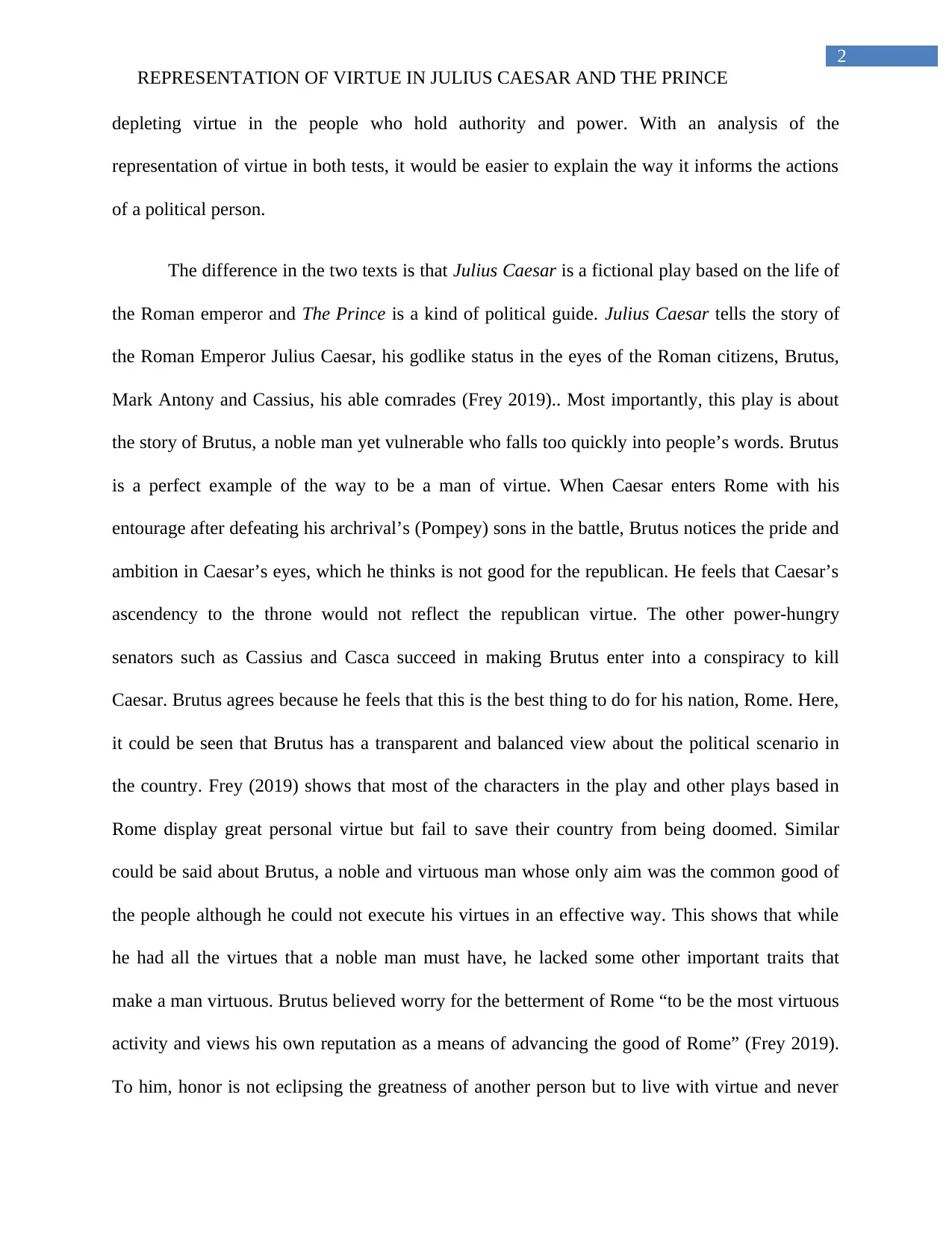
2
REPRESENTATION OF VIRTUE IN JULIUS CAESAR AND THE PRINCE
depleting virtue in the people who hold authority and power. With an analysis of the
representation of virtue in both tests, it would be easier to explain the way it informs the actions
of a political person.
The difference in the two texts is that Julius Caesar is a fictional play based on the life of
the Roman emperor and The Prince is a kind of political guide. Julius Caesar tells the story of
the Roman Emperor Julius Caesar, his godlike status in the eyes of the Roman citizens, Brutus,
Mark Antony and Cassius, his able comrades (Frey 2019).. Most importantly, this play is about
the story of Brutus, a noble man yet vulnerable who falls too quickly into people’s words. Brutus
is a perfect example of the way to be a man of virtue. When Caesar enters Rome with his
entourage after defeating his archrival’s (Pompey) sons in the battle, Brutus notices the pride and
ambition in Caesar’s eyes, which he thinks is not good for the republican. He feels that Caesar’s
ascendency to the throne would not reflect the republican virtue. The other power-hungry
senators such as Cassius and Casca succeed in making Brutus enter into a conspiracy to kill
Caesar. Brutus agrees because he feels that this is the best thing to do for his nation, Rome. Here,
it could be seen that Brutus has a transparent and balanced view about the political scenario in
the country. Frey (2019) shows that most of the characters in the play and other plays based in
Rome display great personal virtue but fail to save their country from being doomed. Similar
could be said about Brutus, a noble and virtuous man whose only aim was the common good of
the people although he could not execute his virtues in an effective way. This shows that while
he had all the virtues that a noble man must have, he lacked some other important traits that
make a man virtuous. Brutus believed worry for the betterment of Rome “to be the most virtuous
activity and views his own reputation as a means of advancing the good of Rome” (Frey 2019).
To him, honor is not eclipsing the greatness of another person but to live with virtue and never
REPRESENTATION OF VIRTUE IN JULIUS CAESAR AND THE PRINCE
depleting virtue in the people who hold authority and power. With an analysis of the
representation of virtue in both tests, it would be easier to explain the way it informs the actions
of a political person.
The difference in the two texts is that Julius Caesar is a fictional play based on the life of
the Roman emperor and The Prince is a kind of political guide. Julius Caesar tells the story of
the Roman Emperor Julius Caesar, his godlike status in the eyes of the Roman citizens, Brutus,
Mark Antony and Cassius, his able comrades (Frey 2019).. Most importantly, this play is about
the story of Brutus, a noble man yet vulnerable who falls too quickly into people’s words. Brutus
is a perfect example of the way to be a man of virtue. When Caesar enters Rome with his
entourage after defeating his archrival’s (Pompey) sons in the battle, Brutus notices the pride and
ambition in Caesar’s eyes, which he thinks is not good for the republican. He feels that Caesar’s
ascendency to the throne would not reflect the republican virtue. The other power-hungry
senators such as Cassius and Casca succeed in making Brutus enter into a conspiracy to kill
Caesar. Brutus agrees because he feels that this is the best thing to do for his nation, Rome. Here,
it could be seen that Brutus has a transparent and balanced view about the political scenario in
the country. Frey (2019) shows that most of the characters in the play and other plays based in
Rome display great personal virtue but fail to save their country from being doomed. Similar
could be said about Brutus, a noble and virtuous man whose only aim was the common good of
the people although he could not execute his virtues in an effective way. This shows that while
he had all the virtues that a noble man must have, he lacked some other important traits that
make a man virtuous. Brutus believed worry for the betterment of Rome “to be the most virtuous
activity and views his own reputation as a means of advancing the good of Rome” (Frey 2019).
To him, honor is not eclipsing the greatness of another person but to live with virtue and never
⊘ This is a preview!⊘
Do you want full access?
Subscribe today to unlock all pages.

Trusted by 1+ million students worldwide
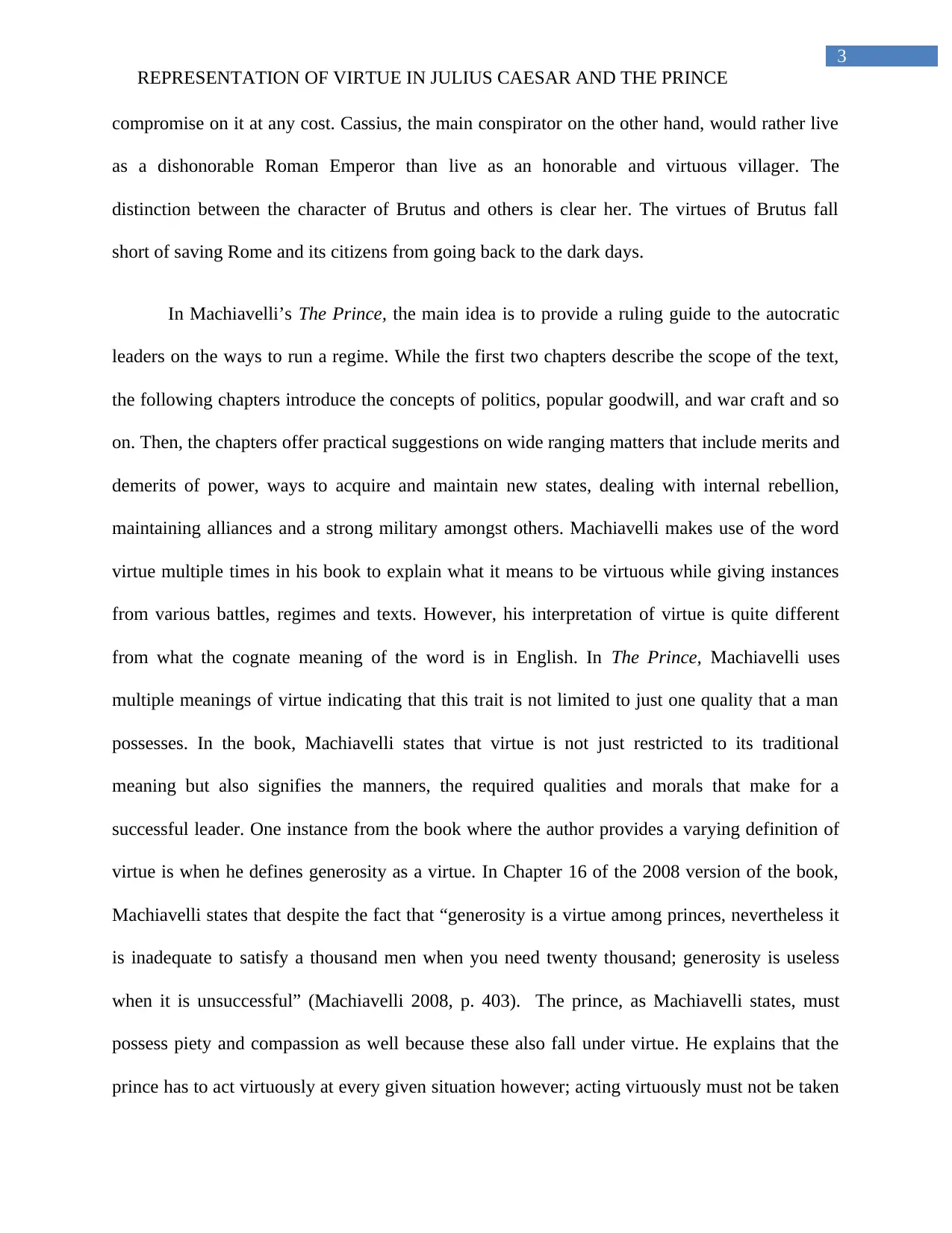
3
REPRESENTATION OF VIRTUE IN JULIUS CAESAR AND THE PRINCE
compromise on it at any cost. Cassius, the main conspirator on the other hand, would rather live
as a dishonorable Roman Emperor than live as an honorable and virtuous villager. The
distinction between the character of Brutus and others is clear her. The virtues of Brutus fall
short of saving Rome and its citizens from going back to the dark days.
In Machiavelli’s The Prince, the main idea is to provide a ruling guide to the autocratic
leaders on the ways to run a regime. While the first two chapters describe the scope of the text,
the following chapters introduce the concepts of politics, popular goodwill, and war craft and so
on. Then, the chapters offer practical suggestions on wide ranging matters that include merits and
demerits of power, ways to acquire and maintain new states, dealing with internal rebellion,
maintaining alliances and a strong military amongst others. Machiavelli makes use of the word
virtue multiple times in his book to explain what it means to be virtuous while giving instances
from various battles, regimes and texts. However, his interpretation of virtue is quite different
from what the cognate meaning of the word is in English. In The Prince, Machiavelli uses
multiple meanings of virtue indicating that this trait is not limited to just one quality that a man
possesses. In the book, Machiavelli states that virtue is not just restricted to its traditional
meaning but also signifies the manners, the required qualities and morals that make for a
successful leader. One instance from the book where the author provides a varying definition of
virtue is when he defines generosity as a virtue. In Chapter 16 of the 2008 version of the book,
Machiavelli states that despite the fact that “generosity is a virtue among princes, nevertheless it
is inadequate to satisfy a thousand men when you need twenty thousand; generosity is useless
when it is unsuccessful” (Machiavelli 2008, p. 403). The prince, as Machiavelli states, must
possess piety and compassion as well because these also fall under virtue. He explains that the
prince has to act virtuously at every given situation however; acting virtuously must not be taken
REPRESENTATION OF VIRTUE IN JULIUS CAESAR AND THE PRINCE
compromise on it at any cost. Cassius, the main conspirator on the other hand, would rather live
as a dishonorable Roman Emperor than live as an honorable and virtuous villager. The
distinction between the character of Brutus and others is clear her. The virtues of Brutus fall
short of saving Rome and its citizens from going back to the dark days.
In Machiavelli’s The Prince, the main idea is to provide a ruling guide to the autocratic
leaders on the ways to run a regime. While the first two chapters describe the scope of the text,
the following chapters introduce the concepts of politics, popular goodwill, and war craft and so
on. Then, the chapters offer practical suggestions on wide ranging matters that include merits and
demerits of power, ways to acquire and maintain new states, dealing with internal rebellion,
maintaining alliances and a strong military amongst others. Machiavelli makes use of the word
virtue multiple times in his book to explain what it means to be virtuous while giving instances
from various battles, regimes and texts. However, his interpretation of virtue is quite different
from what the cognate meaning of the word is in English. In The Prince, Machiavelli uses
multiple meanings of virtue indicating that this trait is not limited to just one quality that a man
possesses. In the book, Machiavelli states that virtue is not just restricted to its traditional
meaning but also signifies the manners, the required qualities and morals that make for a
successful leader. One instance from the book where the author provides a varying definition of
virtue is when he defines generosity as a virtue. In Chapter 16 of the 2008 version of the book,
Machiavelli states that despite the fact that “generosity is a virtue among princes, nevertheless it
is inadequate to satisfy a thousand men when you need twenty thousand; generosity is useless
when it is unsuccessful” (Machiavelli 2008, p. 403). The prince, as Machiavelli states, must
possess piety and compassion as well because these also fall under virtue. He explains that the
prince has to act virtuously at every given situation however; acting virtuously must not be taken
Paraphrase This Document
Need a fresh take? Get an instant paraphrase of this document with our AI Paraphraser
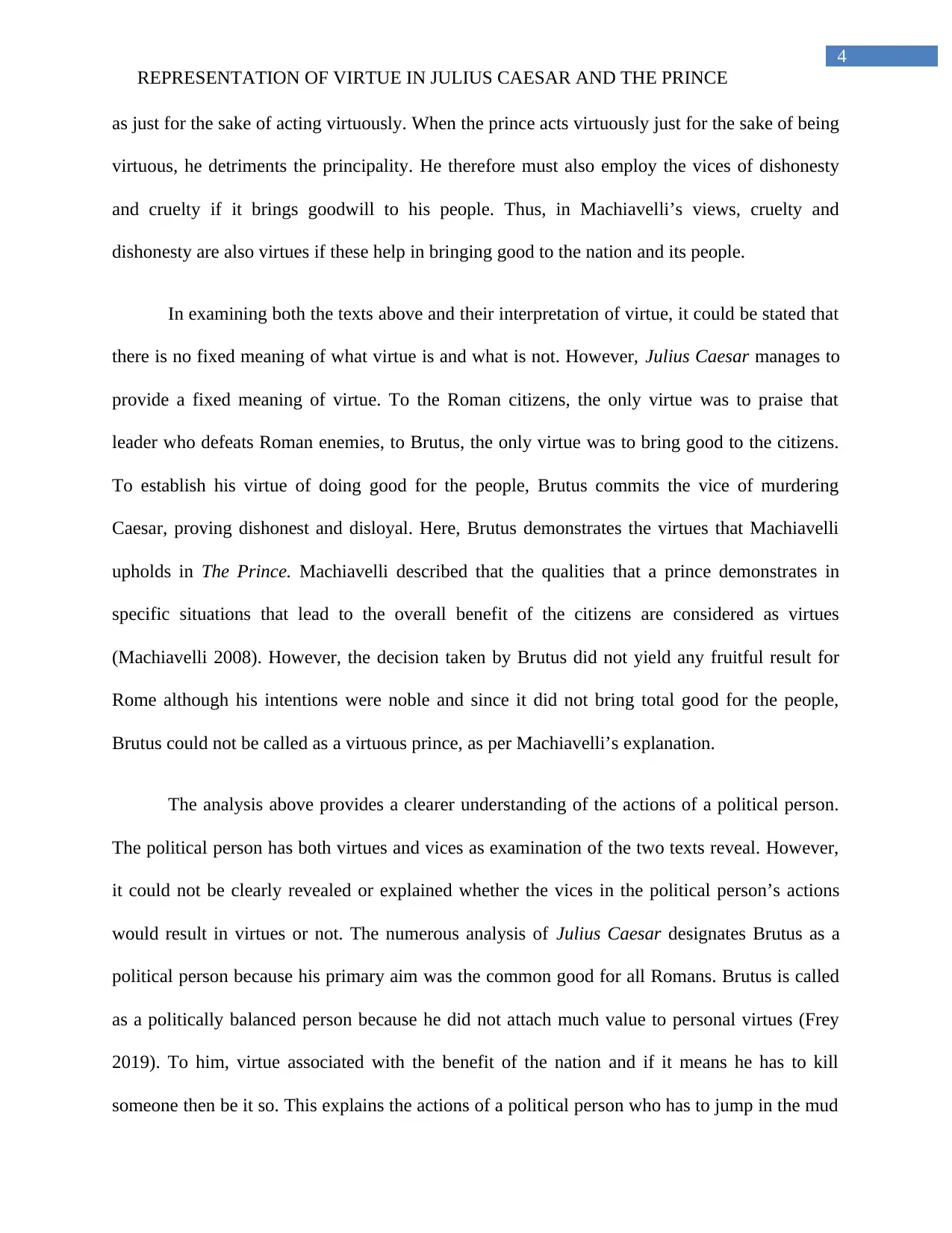
4
REPRESENTATION OF VIRTUE IN JULIUS CAESAR AND THE PRINCE
as just for the sake of acting virtuously. When the prince acts virtuously just for the sake of being
virtuous, he detriments the principality. He therefore must also employ the vices of dishonesty
and cruelty if it brings goodwill to his people. Thus, in Machiavelli’s views, cruelty and
dishonesty are also virtues if these help in bringing good to the nation and its people.
In examining both the texts above and their interpretation of virtue, it could be stated that
there is no fixed meaning of what virtue is and what is not. However, Julius Caesar manages to
provide a fixed meaning of virtue. To the Roman citizens, the only virtue was to praise that
leader who defeats Roman enemies, to Brutus, the only virtue was to bring good to the citizens.
To establish his virtue of doing good for the people, Brutus commits the vice of murdering
Caesar, proving dishonest and disloyal. Here, Brutus demonstrates the virtues that Machiavelli
upholds in The Prince. Machiavelli described that the qualities that a prince demonstrates in
specific situations that lead to the overall benefit of the citizens are considered as virtues
(Machiavelli 2008). However, the decision taken by Brutus did not yield any fruitful result for
Rome although his intentions were noble and since it did not bring total good for the people,
Brutus could not be called as a virtuous prince, as per Machiavelli’s explanation.
The analysis above provides a clearer understanding of the actions of a political person.
The political person has both virtues and vices as examination of the two texts reveal. However,
it could not be clearly revealed or explained whether the vices in the political person’s actions
would result in virtues or not. The numerous analysis of Julius Caesar designates Brutus as a
political person because his primary aim was the common good for all Romans. Brutus is called
as a politically balanced person because he did not attach much value to personal virtues (Frey
2019). To him, virtue associated with the benefit of the nation and if it means he has to kill
someone then be it so. This explains the actions of a political person who has to jump in the mud
REPRESENTATION OF VIRTUE IN JULIUS CAESAR AND THE PRINCE
as just for the sake of acting virtuously. When the prince acts virtuously just for the sake of being
virtuous, he detriments the principality. He therefore must also employ the vices of dishonesty
and cruelty if it brings goodwill to his people. Thus, in Machiavelli’s views, cruelty and
dishonesty are also virtues if these help in bringing good to the nation and its people.
In examining both the texts above and their interpretation of virtue, it could be stated that
there is no fixed meaning of what virtue is and what is not. However, Julius Caesar manages to
provide a fixed meaning of virtue. To the Roman citizens, the only virtue was to praise that
leader who defeats Roman enemies, to Brutus, the only virtue was to bring good to the citizens.
To establish his virtue of doing good for the people, Brutus commits the vice of murdering
Caesar, proving dishonest and disloyal. Here, Brutus demonstrates the virtues that Machiavelli
upholds in The Prince. Machiavelli described that the qualities that a prince demonstrates in
specific situations that lead to the overall benefit of the citizens are considered as virtues
(Machiavelli 2008). However, the decision taken by Brutus did not yield any fruitful result for
Rome although his intentions were noble and since it did not bring total good for the people,
Brutus could not be called as a virtuous prince, as per Machiavelli’s explanation.
The analysis above provides a clearer understanding of the actions of a political person.
The political person has both virtues and vices as examination of the two texts reveal. However,
it could not be clearly revealed or explained whether the vices in the political person’s actions
would result in virtues or not. The numerous analysis of Julius Caesar designates Brutus as a
political person because his primary aim was the common good for all Romans. Brutus is called
as a politically balanced person because he did not attach much value to personal virtues (Frey
2019). To him, virtue associated with the benefit of the nation and if it means he has to kill
someone then be it so. This explains the actions of a political person who has to jump in the mud
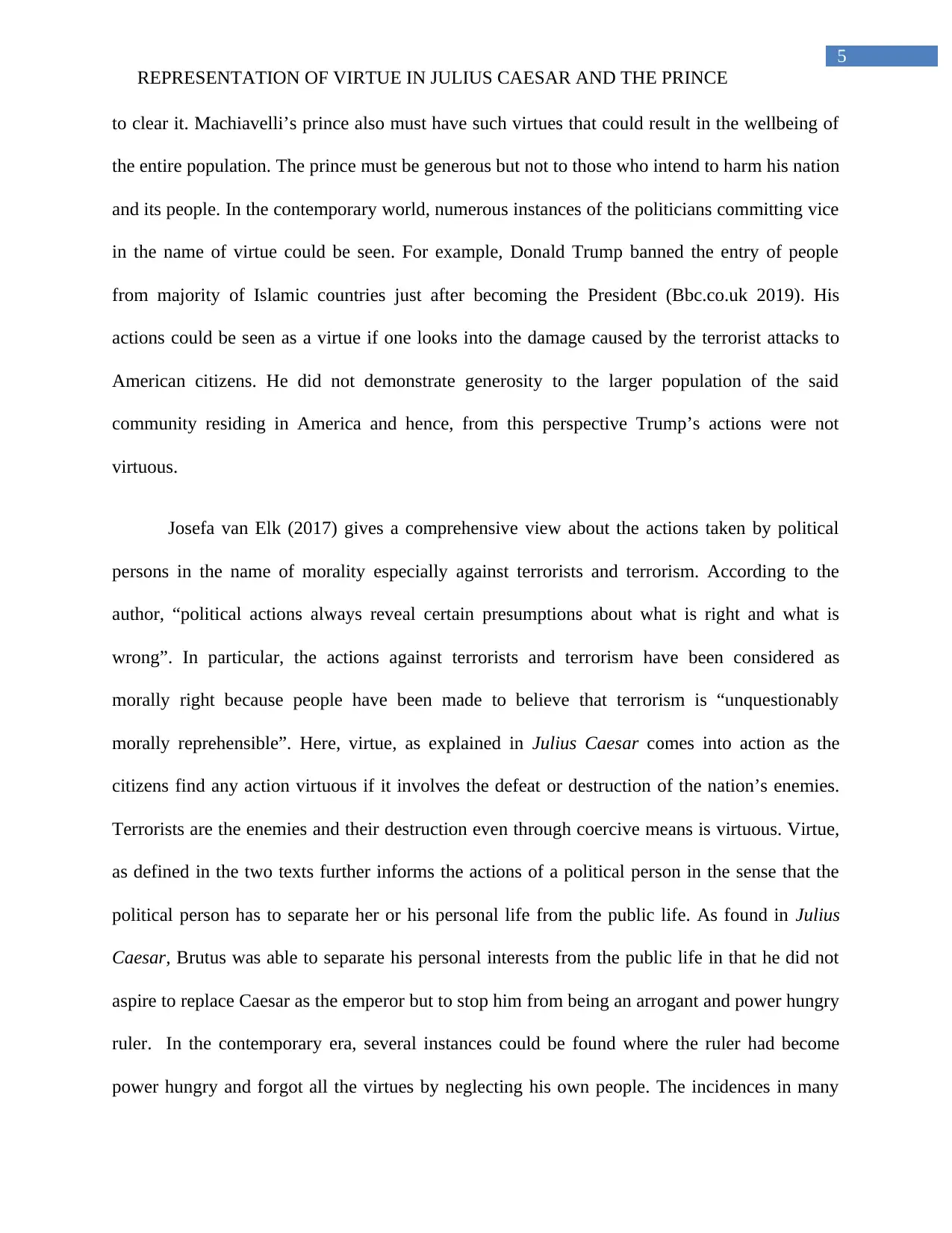
5
REPRESENTATION OF VIRTUE IN JULIUS CAESAR AND THE PRINCE
to clear it. Machiavelli’s prince also must have such virtues that could result in the wellbeing of
the entire population. The prince must be generous but not to those who intend to harm his nation
and its people. In the contemporary world, numerous instances of the politicians committing vice
in the name of virtue could be seen. For example, Donald Trump banned the entry of people
from majority of Islamic countries just after becoming the President (Bbc.co.uk 2019). His
actions could be seen as a virtue if one looks into the damage caused by the terrorist attacks to
American citizens. He did not demonstrate generosity to the larger population of the said
community residing in America and hence, from this perspective Trump’s actions were not
virtuous.
Josefa van Elk (2017) gives a comprehensive view about the actions taken by political
persons in the name of morality especially against terrorists and terrorism. According to the
author, “political actions always reveal certain presumptions about what is right and what is
wrong”. In particular, the actions against terrorists and terrorism have been considered as
morally right because people have been made to believe that terrorism is “unquestionably
morally reprehensible”. Here, virtue, as explained in Julius Caesar comes into action as the
citizens find any action virtuous if it involves the defeat or destruction of the nation’s enemies.
Terrorists are the enemies and their destruction even through coercive means is virtuous. Virtue,
as defined in the two texts further informs the actions of a political person in the sense that the
political person has to separate her or his personal life from the public life. As found in Julius
Caesar, Brutus was able to separate his personal interests from the public life in that he did not
aspire to replace Caesar as the emperor but to stop him from being an arrogant and power hungry
ruler. In the contemporary era, several instances could be found where the ruler had become
power hungry and forgot all the virtues by neglecting his own people. The incidences in many
REPRESENTATION OF VIRTUE IN JULIUS CAESAR AND THE PRINCE
to clear it. Machiavelli’s prince also must have such virtues that could result in the wellbeing of
the entire population. The prince must be generous but not to those who intend to harm his nation
and its people. In the contemporary world, numerous instances of the politicians committing vice
in the name of virtue could be seen. For example, Donald Trump banned the entry of people
from majority of Islamic countries just after becoming the President (Bbc.co.uk 2019). His
actions could be seen as a virtue if one looks into the damage caused by the terrorist attacks to
American citizens. He did not demonstrate generosity to the larger population of the said
community residing in America and hence, from this perspective Trump’s actions were not
virtuous.
Josefa van Elk (2017) gives a comprehensive view about the actions taken by political
persons in the name of morality especially against terrorists and terrorism. According to the
author, “political actions always reveal certain presumptions about what is right and what is
wrong”. In particular, the actions against terrorists and terrorism have been considered as
morally right because people have been made to believe that terrorism is “unquestionably
morally reprehensible”. Here, virtue, as explained in Julius Caesar comes into action as the
citizens find any action virtuous if it involves the defeat or destruction of the nation’s enemies.
Terrorists are the enemies and their destruction even through coercive means is virtuous. Virtue,
as defined in the two texts further informs the actions of a political person in the sense that the
political person has to separate her or his personal life from the public life. As found in Julius
Caesar, Brutus was able to separate his personal interests from the public life in that he did not
aspire to replace Caesar as the emperor but to stop him from being an arrogant and power hungry
ruler. In the contemporary era, several instances could be found where the ruler had become
power hungry and forgot all the virtues by neglecting his own people. The incidences in many
⊘ This is a preview!⊘
Do you want full access?
Subscribe today to unlock all pages.

Trusted by 1+ million students worldwide
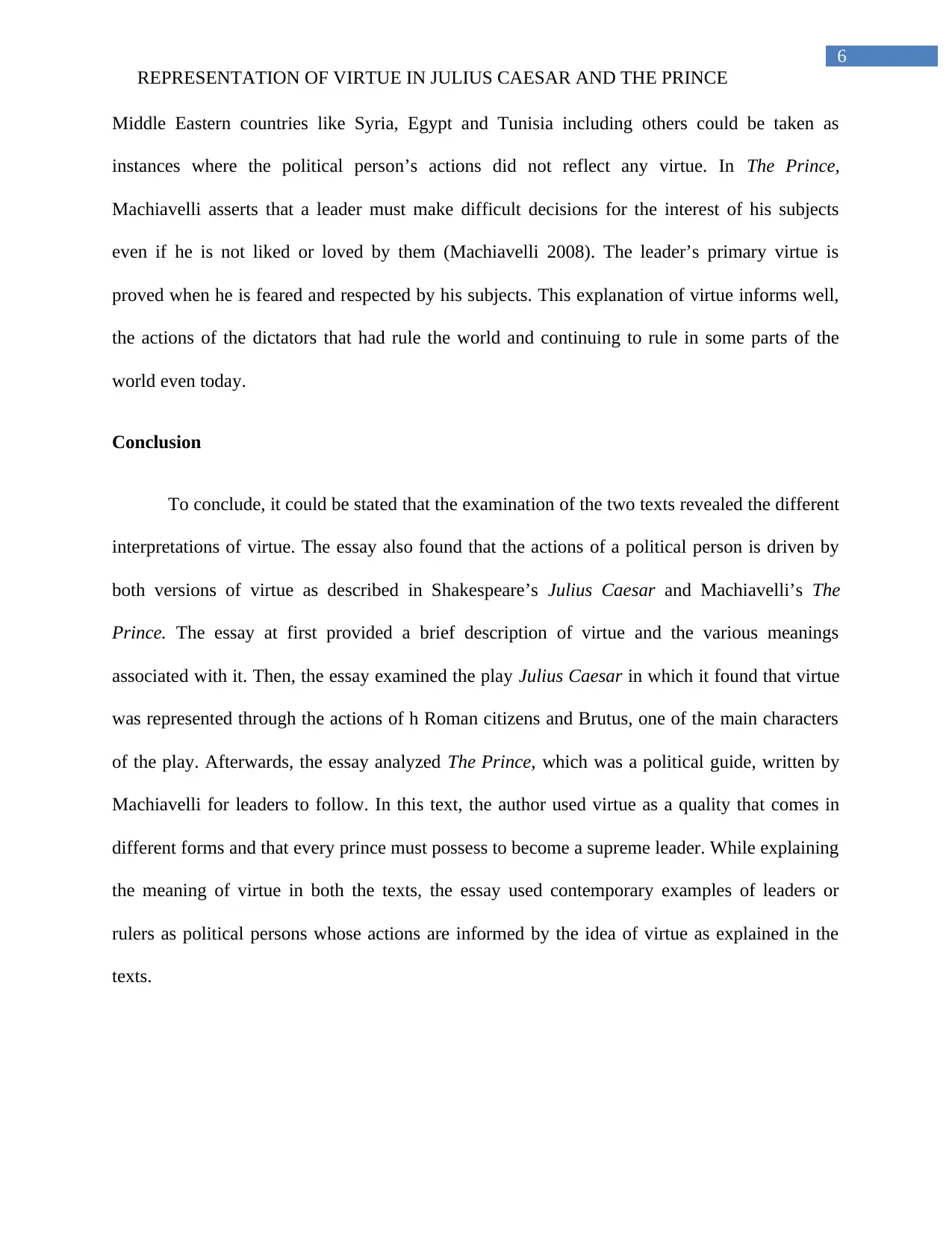
6
REPRESENTATION OF VIRTUE IN JULIUS CAESAR AND THE PRINCE
Middle Eastern countries like Syria, Egypt and Tunisia including others could be taken as
instances where the political person’s actions did not reflect any virtue. In The Prince,
Machiavelli asserts that a leader must make difficult decisions for the interest of his subjects
even if he is not liked or loved by them (Machiavelli 2008). The leader’s primary virtue is
proved when he is feared and respected by his subjects. This explanation of virtue informs well,
the actions of the dictators that had rule the world and continuing to rule in some parts of the
world even today.
Conclusion
To conclude, it could be stated that the examination of the two texts revealed the different
interpretations of virtue. The essay also found that the actions of a political person is driven by
both versions of virtue as described in Shakespeare’s Julius Caesar and Machiavelli’s The
Prince. The essay at first provided a brief description of virtue and the various meanings
associated with it. Then, the essay examined the play Julius Caesar in which it found that virtue
was represented through the actions of h Roman citizens and Brutus, one of the main characters
of the play. Afterwards, the essay analyzed The Prince, which was a political guide, written by
Machiavelli for leaders to follow. In this text, the author used virtue as a quality that comes in
different forms and that every prince must possess to become a supreme leader. While explaining
the meaning of virtue in both the texts, the essay used contemporary examples of leaders or
rulers as political persons whose actions are informed by the idea of virtue as explained in the
texts.
REPRESENTATION OF VIRTUE IN JULIUS CAESAR AND THE PRINCE
Middle Eastern countries like Syria, Egypt and Tunisia including others could be taken as
instances where the political person’s actions did not reflect any virtue. In The Prince,
Machiavelli asserts that a leader must make difficult decisions for the interest of his subjects
even if he is not liked or loved by them (Machiavelli 2008). The leader’s primary virtue is
proved when he is feared and respected by his subjects. This explanation of virtue informs well,
the actions of the dictators that had rule the world and continuing to rule in some parts of the
world even today.
Conclusion
To conclude, it could be stated that the examination of the two texts revealed the different
interpretations of virtue. The essay also found that the actions of a political person is driven by
both versions of virtue as described in Shakespeare’s Julius Caesar and Machiavelli’s The
Prince. The essay at first provided a brief description of virtue and the various meanings
associated with it. Then, the essay examined the play Julius Caesar in which it found that virtue
was represented through the actions of h Roman citizens and Brutus, one of the main characters
of the play. Afterwards, the essay analyzed The Prince, which was a political guide, written by
Machiavelli for leaders to follow. In this text, the author used virtue as a quality that comes in
different forms and that every prince must possess to become a supreme leader. While explaining
the meaning of virtue in both the texts, the essay used contemporary examples of leaders or
rulers as political persons whose actions are informed by the idea of virtue as explained in the
texts.
Paraphrase This Document
Need a fresh take? Get an instant paraphrase of this document with our AI Paraphraser
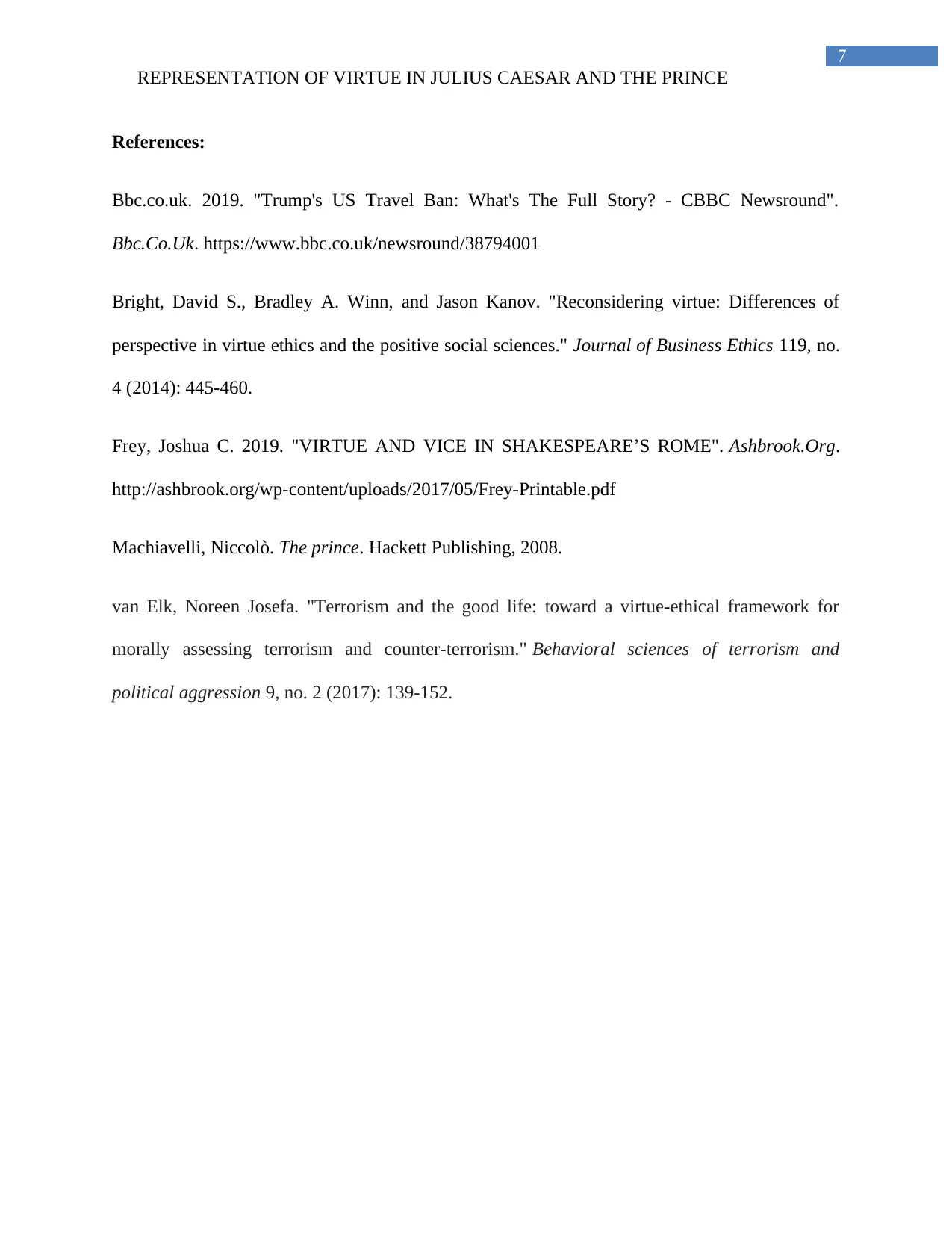
7
REPRESENTATION OF VIRTUE IN JULIUS CAESAR AND THE PRINCE
References:
Bbc.co.uk. 2019. "Trump's US Travel Ban: What's The Full Story? - CBBC Newsround".
Bbc.Co.Uk. https://www.bbc.co.uk/newsround/38794001
Bright, David S., Bradley A. Winn, and Jason Kanov. "Reconsidering virtue: Differences of
perspective in virtue ethics and the positive social sciences." Journal of Business Ethics 119, no.
4 (2014): 445-460.
Frey, Joshua C. 2019. "VIRTUE AND VICE IN SHAKESPEARE’S ROME". Ashbrook.Org.
http://ashbrook.org/wp-content/uploads/2017/05/Frey-Printable.pdf
Machiavelli, Niccolò. The prince. Hackett Publishing, 2008.
van Elk, Noreen Josefa. "Terrorism and the good life: toward a virtue-ethical framework for
morally assessing terrorism and counter-terrorism." Behavioral sciences of terrorism and
political aggression 9, no. 2 (2017): 139-152.
REPRESENTATION OF VIRTUE IN JULIUS CAESAR AND THE PRINCE
References:
Bbc.co.uk. 2019. "Trump's US Travel Ban: What's The Full Story? - CBBC Newsround".
Bbc.Co.Uk. https://www.bbc.co.uk/newsround/38794001
Bright, David S., Bradley A. Winn, and Jason Kanov. "Reconsidering virtue: Differences of
perspective in virtue ethics and the positive social sciences." Journal of Business Ethics 119, no.
4 (2014): 445-460.
Frey, Joshua C. 2019. "VIRTUE AND VICE IN SHAKESPEARE’S ROME". Ashbrook.Org.
http://ashbrook.org/wp-content/uploads/2017/05/Frey-Printable.pdf
Machiavelli, Niccolò. The prince. Hackett Publishing, 2008.
van Elk, Noreen Josefa. "Terrorism and the good life: toward a virtue-ethical framework for
morally assessing terrorism and counter-terrorism." Behavioral sciences of terrorism and
political aggression 9, no. 2 (2017): 139-152.
1 out of 8
Your All-in-One AI-Powered Toolkit for Academic Success.
+13062052269
info@desklib.com
Available 24*7 on WhatsApp / Email
![[object Object]](/_next/static/media/star-bottom.7253800d.svg)
Unlock your academic potential
Copyright © 2020–2026 A2Z Services. All Rights Reserved. Developed and managed by ZUCOL.
